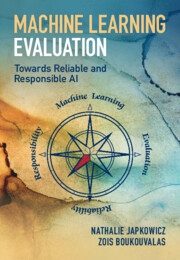Book contents
- Frontmatter
- Dedication
- Contents
- Abbreviations
- Preface
- Acknowledgments
- Part I Preliminary Considerations
- Part II Evaluation for Classification
- Part III Evaluation for Other Settings
- Part IV Evaluation from a Practical Perspective
- 10 Industrial-Strength Evaluation
- 11 Responsible Machine Learning
- 12 Conclusion
- Appendices
- References
- Index
10 - Industrial-Strength Evaluation
from Part IV - Evaluation from a Practical Perspective
Published online by Cambridge University Press: 07 November 2024
- Frontmatter
- Dedication
- Contents
- Abbreviations
- Preface
- Acknowledgments
- Part I Preliminary Considerations
- Part II Evaluation for Classification
- Part III Evaluation for Other Settings
- Part IV Evaluation from a Practical Perspective
- 10 Industrial-Strength Evaluation
- 11 Responsible Machine Learning
- 12 Conclusion
- Appendices
- References
- Index
Summary
In Chapter 10, the book turns to practical considerations. In particular, it surveys the software engineering discipline with its rigorous software testing methods, and asks how these techniques can be adapted to the subfield of machine learning. The adaptation is not straightforward, as machine learning algorithms behave in non-deterministic ways aggravated by data, algorithm, and platform imperfections. These issues are discussed and some of the steps taken to handle them are reviewed. The chapter then turns to the practice of online testing and addresses the ethics of machine learning deployment. The chapter concludes with a discussion of current industry practice along with suggestions on how to improve the safety of industrial deployment in the future.
- Type
- Chapter
- Information
- Machine Learning EvaluationTowards Reliable and Responsible AI, pp. 289 - 307Publisher: Cambridge University PressPrint publication year: 2024

